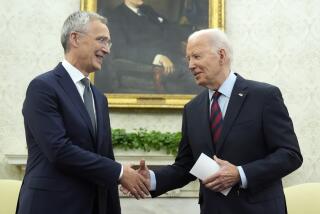Europe Talks Up a Self-Reliant Defense
Neither European parliaments nor the people they represent are willing at present to spend the money it would take to build a European defense force with substantially less dependence upon the United States. But the subject is clearly in the minds of top political leaders and their national security establishments.
Nothing has done more to sharpen European interest than the Euromissile treaty that will be signed in Washington next month by President Reagan and Soviet leader Mikhail S. Gorbachev. Under that agreement, the superpowers will remove from Europe all their nuclear missiles with a range greater than 300 miles.
The average European is delighted and so, officially, are allied governments. Most political leaders in France, Britain and West Germany, however, look upon the treaty with deep unease. So do their senior diplomatic and military aides.
Allied governments worry that Washington is caught up in a mad rush to dismantle the nuclear forces that have guaranteed peace in Europe since World War II. Denuclearization, they feel, would enhance the danger to Europe from Russia’s superiority in conventional, non-nuclear arms.
It’s true, of course, that the Europeans are never comfortable with U.S. policy. On Mondays they worry that intransigent Cold Warriors are going to drag Western Europe into a war with the Soviet Union. On Tuesdays they fret that the Americans will make a deal with the Russians at the expense of European security.
The Europeans are in their Tuesday mode these days. But as evidenced by the extraordinary burst of activity lately, their unease is more serious than before.
Although allied officials don’t like to say so out loud, many now believe--and not without reason--that a substantial reduction of the American troop presence may be inevitable because of budgetary and domestic political pressures. As one European diplomat told newsmen not long ago, “I think that feeling is very widespread.”
The conviction is growing that Europeans had best start relying more on themselves and less on the Americans.
Just last week the defense and foreign ministers of the seven-nation Western European Union met at the Hague and pledged to “develop a more cohesive European defense identity.” Freely translated, they want to speak with one voice in dealing with the United States on issues affecting European security.
Also last week, five prestigious European think tanks issued a warning that “Europe’s security interests are not one and the same as those of the United States.”
Paris and London are said to be exploring ways of coordinating their nuclear-missile submarine fleets.
On Sept. 25 West German Chancellor Helmut Kohl and French President Francois Mitterand disclosed that their governments will start negotiations on forming a joint military council that would be open to other European states. The council would strive to “coordinate and harmonize” matters relating to defense analysis, armaments and the organization and deployment of joint units.
The announcement came at the end of French-German maneuvers clearly aimed at showing that France could and would come to the aid of West Germany in the event of a Soviet invasion. In a symbolically important gesture, the 20,000 French rapid deployment troops were placed under the command of a German general.
The creation of a joint French-German brigade has been under active discussion since July, when it was suggested by Kohl.
Everybody concerned is at pains to emphasize that the displays of French and West German togetherness are not intended to suggest a move away from the North Atlantic Treaty Organization.
The fact remains, however, that the American commander of NATO was not invited to observe the French-German maneuvers. The joint brigade, if it materializes, will not be under NATO command. And knowledgeable Europeans say privately that France and West Germany are indeed anxious to begin preparing for the day when the United States may reduce its military presence in Europe.
The movement toward a more self-reliant Europe may die aborning, however, unless European political leaders can nurture public support for heavier defense expenditures. It is also essential to ease the West German anxiety not to be the only NATO member that would be the target of both sides’ tactical missiles, nuclear artillery shells and other weapons that are not covered by the Euromissile agreement.
The Germans want to make removal of these smaller nuclear weapons an early order of business--a posture that could open the way to ultimate West German pacifism and neutrality because the Soviet superiority in conventional, non-nuclear arms would then become the key element in the continental balance of power.
The thrust of French policy is to get the West Germans so enmeshed in collective European defense efforts that, even under Social Democratic rule, they won’t be tempted toward appeasement as a national security strategy.
The most striking element of the French effort is the evolution away from Gaullist nuclear strategy. France is now trying to convince Bonn that, if war came, the independent French nuclear force would be used to defend West Germany as well as France. That means hitting targets in Soviet bloc territory early on, instead of hitting the invaders in German territory where use of French battlefield nukes would merely add to the destruction of West Germany.
As of now, there is more talk than substance to all this. But talk always has to precede action. If European political leaders and their national security spokesmen keep hammering away at the need for a more independent European role, sooner or later the people may get the message.
Americans should hope so, since the crying need to reduce the U.S. budget deficit is bound to bring heavy pressure on the defense budget--and defense cuts of real magnitude are bound to generate interest in reducing the American contribution to European defense.
More to Read
Sign up for Essential California
The most important California stories and recommendations in your inbox every morning.
You may occasionally receive promotional content from the Los Angeles Times.










